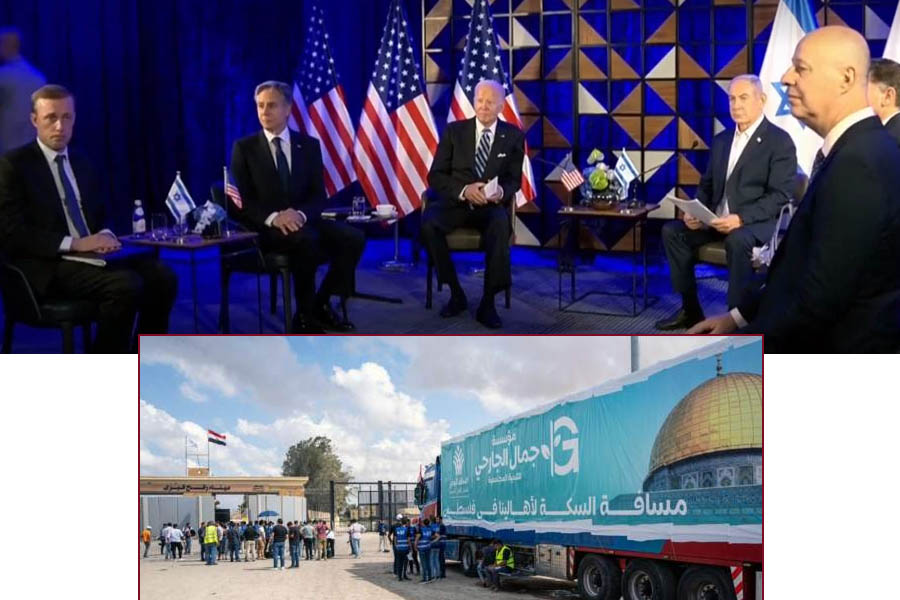
In the midst of the ongoing conflict between Israel and Hamas in Gaza, a ray of hope emerges as international efforts intensify to address the humanitarian crisis. The United Nations (UN) has declared that Gaza urgently needs aid deliveries, with a minimum requirement of 100 trucks per day to meet the pressing needs of its inhabitants.
Rafah Crossing to Open for Aid: What We Know
In a significant development, Israel announced on Wednesday that it will allow Egypt to deliver limited humanitarian aid to the Gaza Strip. This decision followed a devastating blast at Gaza City’s al-Ahli Hospital, which sent shockwaves across the Middle East. US President Joe Biden's visit to Israel coincided with these events, as he aimed to prevent a further escalation of the conflict in the region.
Biden confirmed that Egypt’s president agreed to open the Rafah crossing, allowing the entry of an initial group of 20 trucks carrying essential humanitarian aid. He emphasized that if Hamas diverts any aid for its own use, the assistance will cease immediately. The aid convoy is expected to begin moving on Friday, contingent upon necessary repairs to the road damaged by Israeli airstrikes.
More than 200 trucks, loaded with approximately 3,000 tons of aid, are positioned near the Rafah crossing, which serves as Gaza’s sole connection to Egypt. The aid delivery will be conducted under the supervision of the UN, ensuring that the supplies reach those in need.
Challenges and Complexities
The reopening of the Rafah border crossing offers a glimmer of hope for the people of Gaza. However, challenges persist. Egypt, while agreeing to the aid transfer, remains cautious due to security concerns in northeastern Sinai, where past insurgencies posed significant threats. Despite calls for Gazans to relocate southward, Israel has continued its airstrikes on Rafah, further complicating the situation.
It is noteworthy that the aid delivery excludes fuel, essential for powering hospital generators, raising concerns about the healthcare infrastructure's ability to function effectively.
International Diplomacy and Geopolitical Developments
President Biden's visit to Israel underscored the US administration's support for the nation's security while acknowledging Israel's denial of involvement in the al-Ahli Hospital explosion. Meanwhile, international efforts are underway to mediate and resolve the conflict. Biden has also engaged in private channels with Iran, cautioning against further intervention that could escalate tensions in the Middle East.
Al-Ahli Hospital Explosion:
The aid delivery decision comes in the aftermath of a deadly explosion at Gaza City’s al-Ahli Hospital, resulting in the death of numerous civilians. While Hamas initially blamed Israel for the incident, the Israel Defense Forces claimed that the blast was caused by a misfired Palestinian militant rocket. President Biden supported Israel's denial, citing data from the US defense department.
International Reactions:
The international community, including Arab countries, has expressed concerns over the conflict. President Biden visited Israel and declared his support for the country. Various Arab nations, along with Hamas, blamed Israel for the hospital explosion. There are fears that Iran's involvement could further escalate the conflict in the Middle East, with reports of talks between the US and Iran to prevent such escalation.
The recent escalation in the Israel-Gaza conflict has led to a devastating toll on both sides. Palestinian officials report that 471 people were tragically killed in a massive explosion at a hospital where Palestinian civilians were seeking shelter. While the militant group Hamas initially blamed Israel for the incident, Israel's military asserts that the blast resulted from a misfiring Palestinian rocket. Since the conflict began with a Hamas attack on Israel on October 7th, approximately 1,400 Israelis and 3,500 Palestinians have lost their lives, highlighting the grave humanitarian crisis unfolding in the region. Despite efforts for humanitarian aid and diplomatic talks, the conflict between Israel and Hamas continues to escalate, resulting in casualties on both sides. The situation remains volatile, with ongoing clashes and political tensions in the region.
In summary, the article provides an overview of the humanitarian aid efforts, the incident at al-Ahli Hospital, international reactions, and the complexities surrounding the Rafah border crossing. The situation remains fluid, with concerns about further escalation and the need for sustained efforts to address the humanitarian crisis in Gaza.